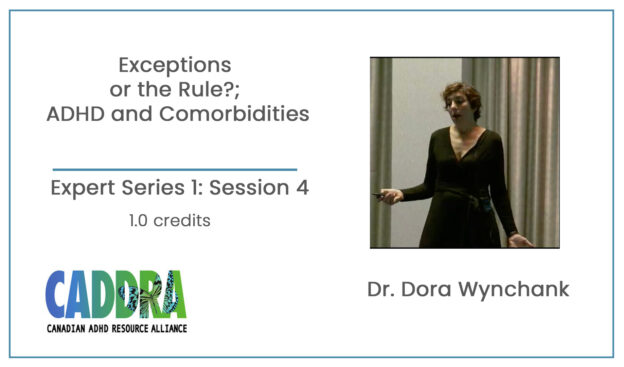1. Discuss a broader view of the clinical presentation of ADHD so that comorbid behavioural,
emotional and neurodevelopmental problems can be better understood.
2. Describe and recognise ADHD symptoms as distinct from those of commonly overlapping disorders
such as sleep problems, depression, anxiety, ASD and borderline personality disorder.
3. Apply the correct treatments for the comorbid conditions mentioned.
While ADHD in adults has been well described and can be diagnosed in many settings, the frequently occurring comorbid conditions may complicate the presentation. In women, co-existing conditions may be diagnosed to the detriment of the identification of ADHD, where diagnosis may be delayed for years. Many men are diagnosed with substance abuse but the underlying ADHD may be missed.
This presentation will present a broader view of ADHD, with focus on the core triad of symptoms, but also overlapping behavioural, emotional, neurodevelopmental problems. We will describe frequently occurring overlapping disorders where comorbidities may lead to confusion in diagnosis.
The identification and management of several sleep disorders, such as apnea, restless legs, circadian rhythm disorders and insomnia, will be presented. ADHD overlapping with depression, anxiety disorders and autism spectrum disorder will also be explored. The theories around how borderline personality disorder co-exists with ADHD will be detailed. Addictions are another area of concern for those treating ADHD, and the common pathways leading to this comorbidity will also be outlined.
Finally, each section on the comorbidities will outline diagnostic pitfalls and treatment approaches. so that clinicians and users have a stepwise approach to management of both the ADHD and comorbid condition.
 Dora Wynchank, MBChB, MMed, FCPsych, PhD works as a psychiatrist at the Intensive Specialist Program for ADHD and as a researcher at the Expertise Centre, ADHD, The Hague.
Dora Wynchank, MBChB, MMed, FCPsych, PhD works as a psychiatrist at the Intensive Specialist Program for ADHD and as a researcher at the Expertise Centre, ADHD, The Hague.
Originally from South Africa, she studied medicine in Cape Town and Johannesburg, where she was active in student politics. Until 2014, she worked as a consultant psychiatrist in state hospitals and in private practice. During this time, she was a clinician, conducted pharmacological research, served on the Executive Committee of the Society of Psychiatrists and was Director of the patient advocacy group for Depression and Anxiety. In August 2014, she relocated with her family to The Netherlands, where she completed a PhD on adult ADHD and biological rhythms, at the Free University of Amsterdam. During the last 6 years, she has researched, published widely and presented her research internationally. She is also editor of the DIVA Foundation. The DIVA is a diagnostic interview for the diagnosis of ADHD, available in 30 languages.
She is currently working in the field of Adult ADHD at a psychiatric clinic called PsyQ and is a proud member of ADHD Europe.
CADDRA – Canadian ADHD Resource Alliance has been approved by the College of Family Physicians, the Royal College of Physicians and Surgeons of Canada and the Canadian Psychological Association to offer 1 Mainpro credit / 1.25 MOC credits for this session. CADDRA maintains responsibility for the program. Participation in a discussion forum and completion of a reflective exercise are required for certification.
Course Content

